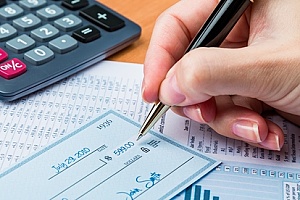Positive Pay – Spring 2026
Help prevent fraudulent checks with Positive Pay. This software scans information from each check and either accepts or rejects the item for payment. Positive Pay can be part of your strategy to avoid fraudulent checks and subsequent long-term collections practices.
As a business owner, you want to eliminate the risk of losing money due to fraudulent activities on your accounts. Positive Pay can help you achieve this. Positive Pay is a widely-known cash management service used by most banks to detect fraud. The automated tool is monitored by the Cash Management Department and acts as a form of insurance for a business against losses, fraud and similar liabilities.
Positive Pay works by matching the dollar amount of each check, the check number and the account number that is presented for payment against checks that have been previously authorized and issued by the business. If these three components do not match up, the check is not paid.
Facets of Positive Pay
 Without security checks like Positive Pay, a company’s funds are put at risk due to fraudsters and identity thieves who can create counterfeit checks. The Positive Pay service ensures that if the check does not match the correct identifying information that the bank has on hand, the check is not honored.
Without security checks like Positive Pay, a company’s funds are put at risk due to fraudsters and identity thieves who can create counterfeit checks. The Positive Pay service ensures that if the check does not match the correct identifying information that the bank has on hand, the check is not honored.
If a check does not match the account number on the check, the dollar amount and the check number, the bank has the option to flag the check, notify a business representative from your company and seek permission to clear the check if it turns out to be valid. In some instances, the payee name is included in the system, but this name is not typically part of the check matching service.
While Positive Pay usually comes at a fee for businesses, most companies find the tool well worth the investment to protect against check fraud and financial losses.
Daily Transmission of Files
The Positive Pay system is simple to use once you understand how it works. As your business issues checks, you will need to transmit a list to the bank containing check numbers, issue dates and dollar amounts of the checks. Each bank has unique format requirements when it comes to transmitting files, so be sure to check with your bank.
Exception Items
When a check is presented to a bank that does not have a “match” in the transmitted file, it becomes what is known as an “exception item.” When an exception item is found, the bank will contact the client, who will then review and instruct the bank to either accept or deny the check presented.
 Each day, the client is sent any checks that have come back as suspicious. The company then has the ability to give its decision to the bank the same day. By catching unauthorized checks before they have the chance to clear in your account, companies can save hundreds, thousands or even more in financial losses due to fraud.
Each day, the client is sent any checks that have come back as suspicious. The company then has the ability to give its decision to the bank the same day. By catching unauthorized checks before they have the chance to clear in your account, companies can save hundreds, thousands or even more in financial losses due to fraud.
|
|





